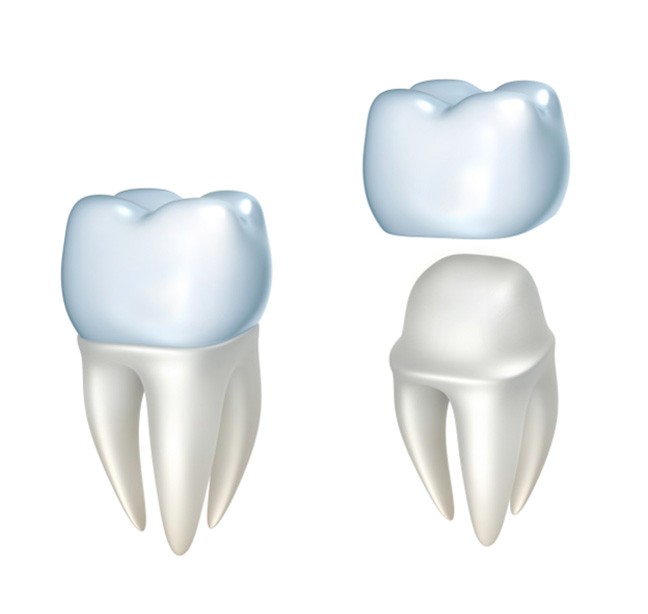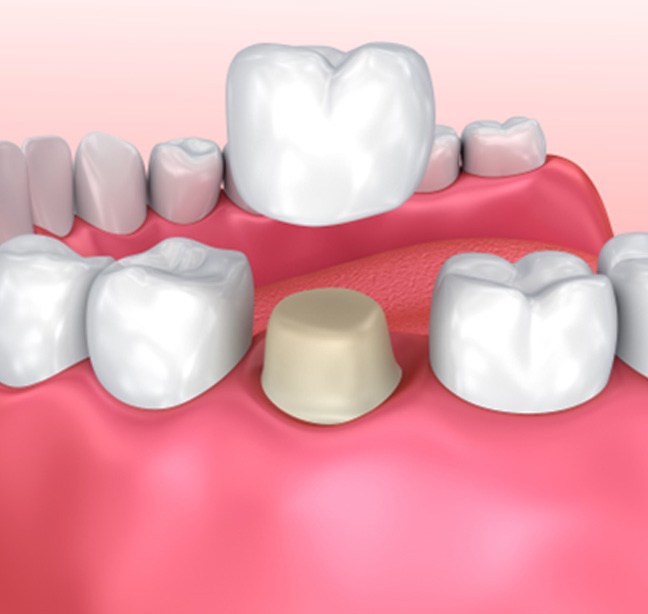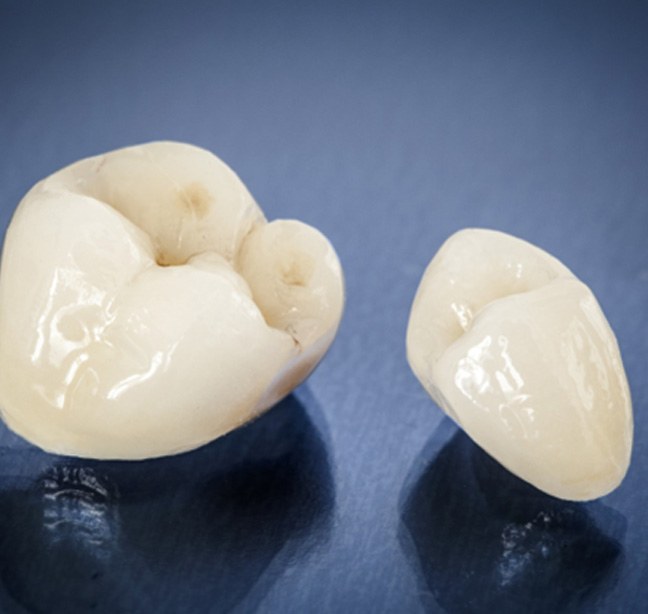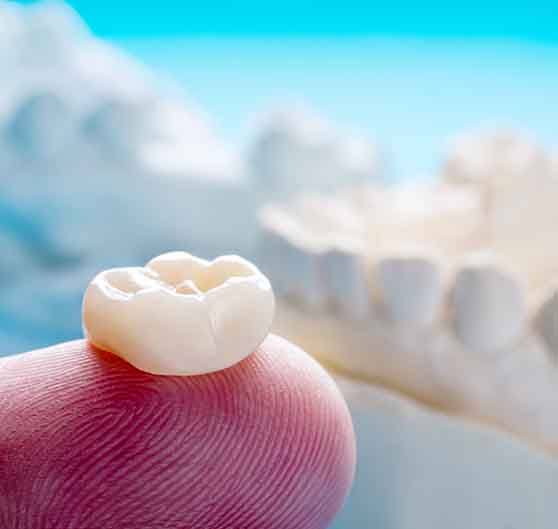Dental Crowns – Richardson, TX
Benefit from Natural-Looking Dental Crowns
A dental crown is the most commonly performed restorative procedure year after year. Placing a customized protective cap over a tooth offers exceptional benefits, which is why dental crowns have been used for decades. Whether you have a cracked tooth or had a root canal, a crown provides a long-lasting solution. Dr. Hsia will create a high-quality restoration that will improve the health and function of your smile.
Why Choose Dr. Hsia for Dental Crowns?
- Natural-Looking Results
- High-Quality Materials
- Advanced Technology
What is a Dental Crown?

Dental crowns are versatile because they can be used for preventive, restorative, and cosmetic reasons. A crown is placed over the entire surface of a tooth above the gum line. It can be used for many reasons, like to prevent a weakened tooth from breaking or to repair a fracture. It can also be a suitable treatment for severe tooth decay. However, crowns can also be used along with other procedures, like after root canal therapy or to support a dental bridge.
You will require an initial consultation to create a personalized treatment plan. Your dentist will explain exactly what you can expect and address any concerns to have confidence in the decision you are making for your smile.
The Dental Crown Process

The process of placing a crown requires two appointments. During your first visit, any preliminary procedures are performed and your tooth is reshaped to allow the crown to fit over it. Once your tooth has been prepped, your dentist will take an impression of it, which is used to create your crown.
The impression is sent to the dental lab to craft your restoration to your exact specifications. It will be made from high-quality materials that are known for their durability and aesthetics. It can take the dental lab a couple of weeks to finish your crown, so you'll need a temporary one in the meantime. Your temporary restoration will protect your tooth while you wait for your final crown to be sent back to the dental office.
Once we have it, you'll return to our office to have the temporary one removed and your permanent crown bonded to your tooth. It will blend in with your teeth, so no one will know it isn't natural. Although it may take a few days to adjust to it, your crown will feel just like a real tooth in no time at all.
The Benefits of Getting a Dental Crown

Dental crowns have been used for generations because they provide long-term results. Modern restorations are metal free, so they are biocompatible to support both your oral and general health. Although they don't contain any metals, they are durable and can last for a decade or longer with the right aftercare, like brushing or flossing.
Crowns are an affordable, convenient, and effective solution to preserve your natural smile. If you need a dental crown, contact our office through our website or give us a call at (214) 617-9134.
Understanding the Cost of Dental Crowns

Getting a dental crown repairs the damaged tooth’s appearance and functionality so you can continue to use it normally. However, many patients want to know how much they’ll pay for their restoration before committing to the treatment.
The total amount due depends significantly on your unique situation, and our team is happy to provide a detailed estimate for your approval once we’ve examined your current condition. Continue reading to learn more about how the price is calculated, and please don't hesitate to contact us with any additional questions.
Factors That Affect the Cost of Dental Crowns

Everyone’s situation is unique, and there are several factors that can affect the cost of your dental crown, including:
- Additional procedures. If you must undergo other treatments before receiving your tooth-shaped cap, such as a root canal, you’ll be responsible for paying for them.
- The materials used. Some practices offer cheaper amalgam metal restorations, but they can detract from your appearance and cause sensitivity. Tooth-colored ceramic reflects light like enamel, can be color-matched to your teeth, and is biocompatible.
- How it’s made. Traditional crowns are created at a dental lab, but some dentists have milling machines onsite, which increases the rate.
You may feel tempted to select the least expensive options when it comes to creating your new tooth, but remember, the quality of dental work is often reflected in its price. It’s often worth investing in a well-made product that feels comfortable, looks realistic, and is more likely to last longer.
Does Dental Insurance Cover Dental Crowns?

Most dental insurance policies consider dental crowns to be a major procedure, and often contribute about 50% of the cost. However, all plans are different, and there’s no guarantee that they’re included, so it’s worth checking the details.
If you’re unsure whether your treatment is covered and require assistance finding the information or submitting forms or claims, please let us know. Our office staff are familiar with various policies and are happy to help you maximize your available benefits.
Options for Making Dental Crowns Affordable

We understand that not everyone carries dental insurance, so we also accept Medicaid and CHIP for you or your family. Otherwise, you’re welcome to apply for one of our flexible financial packages. We’ve partnered with third-party financers, CareCredit and Sunbit, so that if your application is approved, you can divvy your total invoice into more manageable installments.
Dental Crowns FAQs
Are Dental Crowns Permanent?
Although they’re technically not permanent, dental crowns are definitely a long-term solution. On average, you can expect your crown to protect your tooth for anywhere from five to fifteen years.
When Dr. Hsia reshapes your tooth for a dental crown, that procedure is irreversible. This is because tooth enamel cannot grow back after it has been lost. Thus, that tooth will always need a crown for protection going forward.
Dental crowns protect the underlying tooth from additional damage, helping it to survive for much longer than it likely would have if not treated.
You can protect your crown for many years by taking good care of it with daily oral hygiene, regular dental checkups and cleanings with Dr. Hsia, and by wearing a mouthguard or nightguard if necessary.
Do Dental Crowns Get Cavities?
While technically it’s impossible for a dental crown itself to develop cavities, it is still possible for the tooth underneath it to get them. In fact, a crowned tooth has approximately the same risk of tooth decay as an uncrowned tooth.
Poor oral hygiene can allow bacteria and plaque to form around the gumline where your crown meets your tooth. They can then travel underneath the crown, causing cavities.
Preventing cavities in crowned teeth can be done the same way you’d prevent them in any other tooth: by brushing twice a day, flossing, and visiting Dr. Hsia every six months for your dental exam and cleaning appointments.
Can Dental Crowns Be Whitened?
Dental crowns can be made of a variety of materials, but no matter which one is used, they cannot be whitened like your real teeth can. This is because tooth enamel has tiny pores through which bleaching gels can enter and break apart stains. Dental restorations like crowns do not. Thus, your crown should always remain the same color.
Metal-free crowns are designed to blend in with the rest of your teeth as closely as possible. To lower the risk of your natural teeth becoming discolored and making your crown obvious in your smile, talk to Dr. Hsia about getting professional teeth whitening done before your crown is placed. This way, your crown will match your ideal shade of your teeth.
Are Dental Crowns Covered by Insurance?
The short answer to this question is yes, but not always, and not usually in full. Each insurance plan is different, but most of them consider dental crowns to be a major procedure. Therefore, they’re often eligible for coverage at around 50% after you’ve paid your deductible and before you’ve exceeded your annual maximum.
Dental insurance typically only covers dental crowns if they’re deemed medically necessary, such as to repair a tooth with damage or decay. If you’re getting a crown for cosmetic purposes only, it may not qualify for dental insurance coverage.
Even if you don’t have dental insurance, Dr. Hsia accepts flexible financing plans that can break your treatment cost into multiple low-to-no interest payments. Speak to our front office team for more information, or visit our website to apply.




